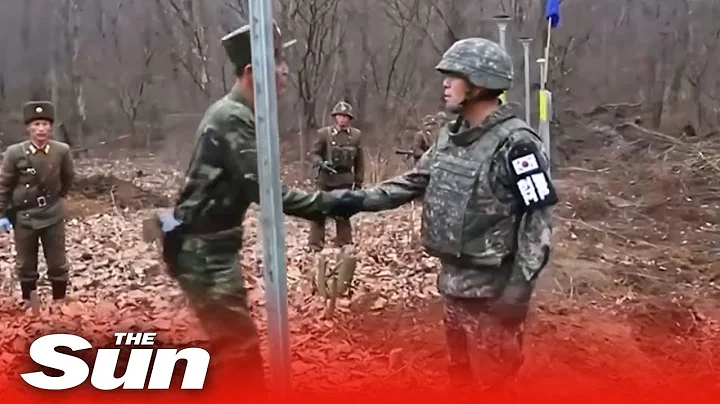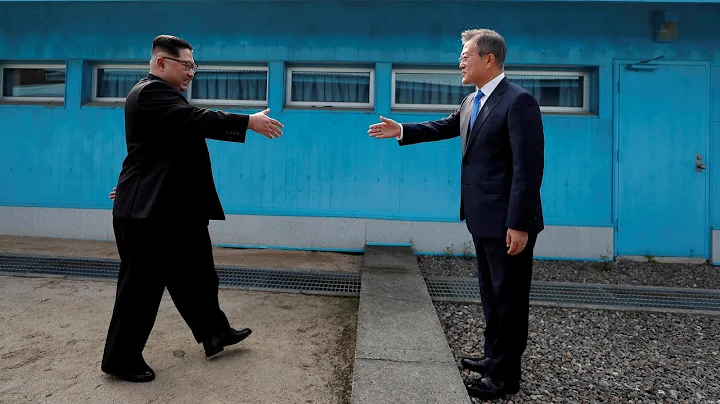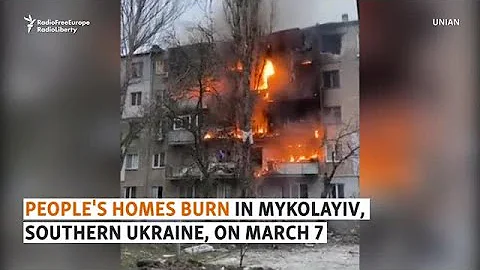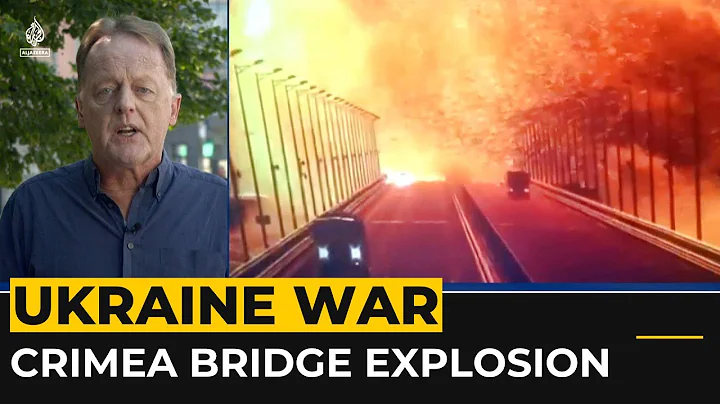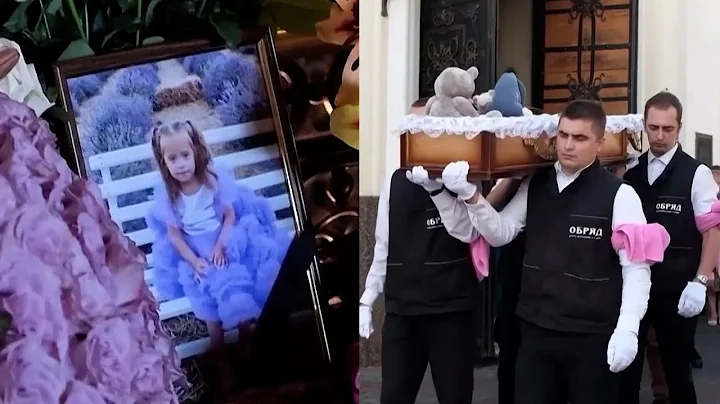At 17:00 in the evening on December 31, 1950, the Chinese and North Korean coalition forces launched a general offensive against the enemy on a ground more than 400 miles wide along the  8th parallel between the east and west coasts of North Korea.
8th parallel between the east and west coasts of North Korea.
This is the first offensive battle of the Volunteer Army after entering North Korea, and it is also the first large-scale coordinated operation between the Volunteer Army and the Korean People's Army after the establishment of the joint headquarters of the Volunteer Army and the Korean People's Army.
After dusk fell, the general attack began. With a deafening bang, thousands of artillery shells accurately bombarded the enemy's positions, destroying the enemy's defenses: bunkers, barbed wire, and deer.
The flames soared into the sky, and the smoke rose into the sky. A flood of volunteer soldiers jumped up from the place where they had been ambushed. With the charge horn that inspired their fighting spirit, they launched a brave attack on the enemy's position.

For a time, the gunfire was intensive, just like the blast of firecrackers on New Year's Eve. The difference was that in the gunfire, hundreds of enemy soldiers were killed by the volunteer soldiers who rushed up before they could escape the fortifications.
The enemy suffered numerous casualties. When the Chinese and North Korean troops broke through the enemy's lines, they were desperate. Even in areas where engineers had no time to clear mines, waves of soldiers waded into the minefields. Along with the firing of bullets and the constant explosion of mines, we also suffered many sacrifices.
What a picture of a fierce and fierce battle! This is the last day of the first half of the twentieth century. It can really be called: the end of the world.
In the combat command room of the Junzili Volunteer Army Headquarters, the shouts of combat staff answering the phone and the ticking of the transceiver keys created a busy and tense atmosphere. Peng Dehuai faced the battle map with stern eyes.
The staff constantly marked the latest status of the assault force's advance position on the map. Peng Dehuai kept his eyes on the map. From here, he looked through the battlefield shrouded in night.
Until the beginning of the general offensive that afternoon, Peng Dehuai did not leave the war room. His heart had already flown to the assault troops on the front line. The huge red arrow on the combat map is clearly marked:

Our Volunteer Army has a total of four corps, the 38th Army, the 39th Army, the 40th Army, and the 50th Army, and reinforced six artillery regiments to form a right-wing attack column. Commanded by Deputy Commander Han Xianchu , they will forcibly break through the section from Gorangpo-ri to Yongpyeong. They will first concentrate their efforts to annihilate the 6th Puppet Division, and then annihilate the 1st Puppet Division. After succeeding, they will advance towards the Uijeongbu Division.
The 42nd Army and the 66th Army of our Volunteer Army and the 44th Artillery Regiment have strengthened to form a middle attack column, under the unified command of the 42nd Army Commander Wu Ruilin and Political Commissar Zhou Biao, and will be east of Yongping to To break through the Mapyeong-ri section, first concentrate the main force on the section from Yongpyeong to Yongnag-dong to annihilate one or two regiments of the Second Puppet Division. After success, they will expand the results in the direction of Gapyeong and Cheongpyeong-ri, cutting off the traffic between Seoul and Chuncheon.
In addition, the 198th Division crossed the Hanjiang River from Hwacheon to feign an attack on the enemy north of Chuncheon, seizing the pseudo-5th Division and supporting the left-wing People's Army's Second and Fifth Corps to cross the Soyang River to the south.
Peng Dehuai knew in his heart that our preparations for this year-end offensive were not very complete.

According to reports, the 1st Artillery Division, which is assigned to the main assault direction, suffered serious losses yesterday. Two regiments of the division rushed to the assembly area before dawn yesterday (30th). The
troops lacked the means of air defense camouflage in the snow season, and the assembly area was close to rivers and road intersections. On that day, the unit was generally attacked by enemy aircraft, resulting in the loss of 19 artillery pieces , and a large number of casualties in personnel and horses.
After intensive repairs, by the time the general offensive began, the 26th Regiment had only 16 cannons and the 25th Regiment had only 8 cannons. The 27th Regiment was unable to participate in the battle due to the long journey and had not yet reached the assembly point. The Second Artillery Division and the Eighth Artillery Division also suffered varying degrees of losses.
Facing the enemy's solid fortifications on the 38th line, our artillery fire seemed too little. However, the general offensive of the battle cannot be postponed. We only hope that our artillery can give full play to its existing firepower and use one against ten to destroy enemy fortifications violently, accurately and ruthlessly. It is now the end of the year, and I hope the suddenness of this battle will make up for the lack of firepower.

Finally, when dusk fell that day, the command headquarters received a report: On a front line hundreds of miles long, our artillery had completed preparations in various assault areas and was about to begin bombarding the enemy positions.At this time, Peng Dehuai stood up and walked quickly back and forth on the ground.
Then another news came: the general offensive began, our artillery positions fired a salvo of artillery fire at the enemy positions, successfully suppressing the enemy's firepower points; the enemy artillery fire was suppressed, and many enemy artillery positions were bombarded within dozens of minutes by our artillery. Not a single round was fired.
A smile appeared on Peng Dehuai's face. He seemed to see: On the hundreds of miles long front line, our army's artillery roared with its head raised, and the rumbling sound shook the earth and mountains. Under the fierce and rapid shooting of our army's artillery, the enemy's defense fortifications were destroyed. After being destroyed, thousands of our soldiers charged towards the enemy positions.
As time passed by, Peng Dehuai walked around in the combat command room, anxiously waiting for news from the front line. More than an hour later, reports from all major assault directions came one after another.
The right-wing attack column has broken through the 38th parallel: the 38th Army broke through the enemy's position in only half an hour between 17:30 and 18:00.

The 39th Army broke through the enemy's position at 17:30 and is developing in depth; the 40th Army broke through the enemy's position at 18:30 and is attacking Dongduchuan along both sides of the railway; the 50th Army is crossing the river from Gaolang Pudong and is making progress smoothly.
The middle attack column broke through the 38th parallel:
The 42nd Army broke through the enemy's formation at 18:20 and was advancing towards Daochenghuang and Shangjiaxi; the 66th Army was still fighting fiercely in Huayue Mountain and Mapingli. Breakthrough can be achieved in ten minutes.
The attack column of the left-wing People's Army is progressing smoothly:
The Second Army has entered Daxing-ri, south of the 38th Parallel; the Fifth Army has entered Xindaili, southwest of Hongchuan, cutting off the enemy's communication between Seoul and Hongchuan.
"Okay! Breakthrough across the board!" Peng Dehuai slapped his thigh and put down the phone happily, "Wai, let's go eat!"

The year-end dinner was held at the Korean People's Army Staff Headquarters, more than ten miles away from the Zhisi headquarters. Outside, the cold wind howled and there was ice and snow. But in the simple thatched house used as a banquet hall, there was a steaming scene.
There is no dining table covered with tablecloths, and all dishes are placed on the floor. President Peng, Park Il-yu and many other leading comrades sat around the kang.
The kang was very hot, so the owner specially gave Peng Dehuai a cushion to sit on, but Peng Dehuai was not used to sitting cross-legged on the kang, so he simply squatted on the kang to eat. Everyone clinked glasses and toasted to celebrate the Chinese and North Korean troops breaking through the 38th parallel.
On the night of the end of the year when the Chinese and North Korean troops broke through the 38th Parallel, a strange cold fell in the vast area from Hantan River to Bukhan River and Soyang River! The temperature plummeted to around 30 degrees below zero.
The howling wind, mixed with snow flakes like steel knives, attacked the thinly dressed Chinese and North Korean troops. It is especially difficult for the many volunteer soldiers. After entering the DPRK for more than two months, he had been fighting continuously. His clothes were already torn and his shoes were torn and tied up with ropes.

Coupled with the lack of supply after entering the DPRK and extremely poor nutrition, their physical strength was severely weakened. Many soldiers suffered from night blindness . On this windy and snowy night, the troops stormed the enemy's position, and then continued to attack and advance. Many soldiers endured the extreme cold and waded through rivers.
What blocked them was not only the minefields, deer and barbed wire fences set up by the enemy, but also the continuous and steep snow-capped mountains and deep valleys. The frozen soles were as slippery as steel plates, and people kept slipping and falling into deep snowy ditches;
the cold wind wrapped in snow flakes and hit the soldiers head-on, choking them and suffocating them. The shoes and socks were soaked by the snow and frozen together, and the sweat gradually melted the snow particles on the clothes. When the cold wind blew, a layer of ice crust formed on the clothes, like armor wearing ice and snow.
As the night goes on, the climate becomes colder and colder. Amidst the rumbling explosions everywhere, the soldiers attacked and advanced quickly with tenacious perseverance. Although one comrade after another was frozen and fell to the ground, the troops advanced without stopping!
The difficulty of this snowstorm march was no less than any difficult battle in the world's military history. Ah, these awe-inspiring warriors! This is the last night of 1950 that future generations will always remember! This cruel battle!

Unlike Peng Dehuai's relaxed mood, at this time, the new opponent of the Volunteer Army, the newly appointed commander of the Eighth Army, Li Qiwei, was very angry.
On the wall of his headquarters, there is such a motto: The only unforgivable mistake of a commander is to be caught by surprise by the enemy.
MacArthur launched the "Christmas End Battle" offensive against the Yalu River in mid-November. The reason why it was defeated by the sudden appearance of the Chinese army and retreated south of the 38th parallel was because there was no preparation in advance and it was defeated. caught off guard.
And this is exactly the mistake a military commander should not make. Ridgway was determined not to repeat MacArthur's mistakes.
When he first took office, he urged all troops to step up the construction of fortifications to cope with the upcoming offensive by the Volunteer Army.
At noon on December 31, as more and more reports from the front indicated that the Volunteer Army's offensive was imminent, Li Qiwei took a plane from the Daegu Basic Command Post to the Seoul Forward Command Post.

On the way from Daegu to Seoul, Ridgway felt no panic: he had prepared as much as possible, and he had deployed several defensive lines south of the 38th parallel.
To this end, Rhee Syngman transferred tens of thousands of North Korean workers to him. These workers wielded picks and shovels day and night to dig trenches and bunkers at the second line of defense positions fifteen miles south of the Han River. Build deer green and barbed wire fences.
In the far south, Ridgway ordered the engineer commander Brigadier General Davidson to lead thousands of migrant workers to build a deep defensive position so that he could rely on this position to hold on in the future.
As the plane passed over what was later called the "Davidson Line of Defense," Ridgway looked down from the porthole and saw ant-like migrant workers digging trenches along the long planned defense line. It looked like the ground was crawling. A huge dragon.
Seeing this scene, Li Qiwei secretly praised Rhee and said: This resolute anti-communist old man is doing his best to support the United Nations Army .

He recalled that on the afternoon of the first day he came to North Korea, he was accompanied by the US Ambassador to South Korea, Mossio, to visit President Rhee Syngman.
At that time, Syngman Rhee's face was very cold. It seemed that the new commander of the Eighth Army, like his predecessor, could only order the troops to retreat and retreat again.
And when Ridgway shook Rhee's hand forcefully, he said frankly: "It's a pleasure to meet you, Mr. President. I am prepared to stay in North Korea for a long time."
As soon as these words were spoken, , I saw Rhee's face, which was originally as cold as frost, revealed a smile as warm as the eastern sun, and even his eyes were moist.
When Li Qiwei proposed to organize civilians to build fortifications, Rhee agreed: "Please tell me how many people are needed, general, thirty thousand? Fifty thousand? Even one hundred thousand!"

Rhee did not break his promise. Now, tens of thousands South Korean migrant workers have built a series of defense fortifications, and construction of the largest "Davidson Line" in the south has begun.
On each defensive front, the tenth battalion of new heavy artillery that he had just called the Washington authorities to quickly airlift from the country would be deployed.
Of course, more importantly, the U.S. Tenth Army has landed in Pusan and is moving south. From the 26th of his arrival in North Korea, the Tenth Army has been officially integrated into the Eighth Army.
The well-equipped divisions of the Tenth Army will become a new force for defense and future counterattack.
Let’s see, in front of such a solid echelon defense front and firepower, how far can the Volunteer Army, which lacks tanks and heavy artillery and relies only on light infantry firepower, advance?
Although when he was in Tokyo, MacArthur repeatedly warned him: Don't underestimate the Chinese. They are accustomed to night movement operations.

However, Li Qiwei always reminded himself: It is necessary not to underestimate the volunteers, but for this army shrouded in a mood of failure, it is more important not to underestimate yourself.
However, unexpected situations often occur in wars. Facing the upcoming attack by the Volunteer Army, to what extent can the various defense plans of the Eighth Army be implemented? Ridgway couldn't get an answer.
Sure enough, just a few hours after he arrived at the Seoul Forward Command Post, the Volunteer Army launched a large-scale attack on the Eighth Army as night fell at dusk. Moreover, the ferocity of the attack really surprised Ridgway.
All night long until dawn, urgent phone calls and telegrams flooded in from the command post. Positions hundreds of miles from west to east were broken through by volunteers everywhere, and all the North Korean divisions south of the front line were in danger. The South Korean First Division and the 6th Division were hit particularly hard and were almost defeated. What happened to
? Aren’t the permanent defenses on the 38th Line strong enough? Are the volunteers flying over with wings as soldiers and generals from heaven? Aren't their offensive paths covered with mine arrays and layers of firepower nets?

On the morning of New Year's Day 1951, just before dawn, Li Qiwei left the group army's forward command post in a jeep.
As the jeep drove a few kilometers north of the Han Territory, Li Qiwei began to encounter the first batch of defeated soldiers retreating from the front line.
The further north he went, the more frustrating scenes he saw one after another: Groups of retreating soldiers fled southward in cars in an endless stream, with their faces bruised by the cold night. With a panicked expression.
Most of the soldiers threw away their weapons, and the troops discarded heavy weapons such as artillery and machine guns in a panic.
Groups of soldiers seemed to be frightened by the attack by the volunteers last night. They fled on a large scale without leadership, order, and weapons.
Li Qiwei has realized that the evacuation of Seoul will be inevitable. Moreover, any attempt to stop these defeated soldiers at this moment is as futile as stopping an avalanche.
The only effective way is to let them flee south to the preset defense line fifteen kilometers south of the Han River.

At that time, their retreat speed may slow down because they are far away from the enemy. Then use military police to prevent them from continuing to retreat, so as to collect these defeated soldiers and reorganize them.
Shortly after noon that day, Ridgway informed Ambassador Mosio that he should inform President Rhee Syngman that the Eighth Army was preparing to withdraw from Seoul immediately and required that some agencies of the South Korean government still in Seoul must evacuate Seoul before 3 p.m.
Starting from 3 p.m., the Han River Bridge and the main thoroughfares are only accessible to the military, and civilian vehicles and pedestrians are prohibited from passing.
Li Qiwei personally supervised the formation at the scene. Hour after hour, swarms of soldiers and long lines of trucks, tanks, artillery and all manner of transports crept across the pontoon bridges.
Before dusk fell, the huge eight-inch howitzer and the heavy "Centurion" tank rumbled onto the pontoon bridge. The pontoon bridge was pressed deeply by the overloaded weight and sank deeply into the river water under the ice.
Since the general offensive began at dusk on December 31, the Chinese and North Korean coalition forces have made rapid progress. Within three days, they broke through the enemy's defenses to a depth of 20 kilometers and forced the enemy to retreat across the board.

"Centurion" tank
The Volunteer Army's right-wing assault group and the People's Army's First Corps immediately pursued the direction of Inchon, Seoul, and Suwon, while the left-wing assault group and the People's Army's Second and Fifth Corps headed toward Hongcheon and Hengcheng. pursuit.
On the fourth day of the battle, the 38th Army and the 40th Army of the right-wing group annihilated the first unit of the 24th U.S. Division south of Uijeongbu; that night, the 149th Division of the 50th Army and the 1st Division of the 39th Army were The 16th Division, the 8th Division of the First Corps of the People's Army, and the 1st Division of the 47th Division entered Seoul one after another.
On the 5th, the 50th Army and the First Army of the People's Army crossed the Han River and attacked in the direction of Incheon, Gimpo, and Suwon.
The Sixty-sixth Army of the Left Assault Group captured Hongchuan on the 4th; the Forty-second Army occupied Toping-ri on the 7th; and occupied Yangping, Bizhou, Lichuan and other places on the 8th; the Second and Fifth Army Corps of the People's Army also arrived In the Hengcheng and Yuanzhou areas, the Chinese and North Korean coalition forces advanced from the 38th parallel to the 37th parallel.
While the good news was spreading frequently, Peng Dehuai calmly noticed the many difficulties our army was experiencing:

Many troops were crowded in a small area south of the 38th parallel, and food supply was a problem;
The climate was extremely cold, and our army's personnel suffered from frostbite. increase. Thousands of people in the 196th Division suffered frostbite, and its 586th Regiment has lost its combat effectiveness due to frostbite. This means that the enemy did not waste a single shot, but our army lost nearly a division!
On the 5th, Han Xianchu reported: In this battle, all the troops suffered losses. Two regiments of the 116th Division suffered more than a thousand casualties, and one regiment of the 119th Division suffered more than 300 casualties. Many battalions and regiments have now lost their attacks. Ability, some divisions even have only half of their personnel fighting at the front.
Moreover, the troops were extremely tired. All the people along the route south of the 38th parallel ran away and their houses were burned down by the enemy. The troops could not eat or sleep, making it difficult to support them. Many soldiers fell down during the march, and many fell behind in groups along the way.
In addition, logistics supplies are insufficient, the troops have no shoes to wear, and ammunition cannot be supplied. The artillery cannot advance with the infantry to support operations due to road damage.
The enemy laid many landmines south of the 38th parallel, and mines struck frequently. More than a hundred people in the Forty Army alone were killed by mines.

Although our army advanced more than 100 kilometers and annihilated nearly 20,000 enemies after seven consecutive days and nights of offensive, according to reports from various troops, the enemy resistance was not resolute, and Seoul also gave up on its own initiative. It seems that the severe cold climate and logistical supplies The difficulties caused greater resistance to our army than the enemy's resistance.
Peng Dehuai was sensitively aware that the enemy might retreat while fighting, inducing our army to advance too far south, thereby exhausting or even defeating our army, and then landing from our side and re-enacting the Battle of Inchon.
On the 8th, a regiment of the 50th Army of the Volunteer Army marched south to Wushan . According to the reconnaissance situation, the Zhisi Operation Department reported to Peng Dehuai: The enemy had an ambush in the Wushan area, forming a pocket.
Peng Dehuai made a prompt decision and ordered a regiment of the 50th Army to withdraw from Wushan, and then ordered the entire offensive to be stopped.
also ordered one unit each of the First Army Corps of the People's Army, the 50th Army, the 38th Army, the 42nd Army, the Fifth and Second Army Corps of the Chinese People's Army to defend, and to cover the main forces to rest and recuperate near the south of the 38th parallel. .

In the third battle to resist U.S. aggression and aid Korea, the Chinese and North Korean coalition forces annihilated more than 19,000 enemies at the cost of 5,800 casualties, advanced the front 110 kilometers south, and recaptured Seoul. Part of the Volunteer Army advanced to the Suwon line near the 37th parallel north latitude, giving The newly appointed Ridgway achieved major political and military victories.
Just as the Volunteer Army was moving into rest and recuperation, Li Qiwei, who had just withdrawn from Seoul, planned a large-scale counterattack at the Eighth Army's forward command post in an attempt to reverse the situation in the Korean War.
The forward command post of the Eighth Army is located on a bare cliff in Yeozhou-two tents are connected end to end, forming a two-room house.
One tent was Ridgway's bedroom, containing a light canvas bed and sleeping bag, as well as a small table, a folding chair, and a washbasin.
The other tent is Ridgway's office, which contains a slightly larger table and several folding chairs, as well as a combat map supported by plywood on the table.

Outside the tent, the cold wind howled from the bottom of the valley and rolled up the cliff, accompanied by waves of pine waves in the valley. In the distance are snow-covered mountains. In the nearby pine-yellow bushes, the calls of some birds occasionally sounded.
There is no hustle and bustle of the city here, allowing him to sit in the tent without being disturbed and study the battle map with concentration.
Everyone knows that war is the continuation of politics. In the course of a war, a certain decision made by a military strategist can often affect the course of military operations and also affect the political situation accordingly.
This is the same truth for commanders on both sides of the war. The correct military decision comes from careful thinking and judgment of the military strength and various situations of both the enemy and ourselves.
Li Qiwei certainly knew that the question of whether to withdraw from North Korea had left the White House at a loss. If he could contain the Volunteer Army's offensive at this time and advance northward accordingly to improve the military situation, it would undoubtedly be his military career. great achievements in.

What a critical moment! Just when MacArthur, known as the legendary military genius, suffered a disastrous military defeat, just when all walks of life in the United States were criticizing Korea's defeat, and just when countries around the world were paying attention to the Korean battlefield.
What is the opportunity? Opportunity is all about whether you can seize it in time. The difference between a smart commander and a stupid commander is this. The former can discover and seize opportunities in time, while the latter turns a blind eye.
attacks! Must attack! Li Qiwei told himself that through the small and exquisite combat terrain map, he seemed to see groups of bombers repeatedly bombing the volunteers' rear transportation lines. Bombed enemy transportation vehicles could be seen everywhere along the roads. .
Along with the picture in front of him that made him very optimistic, a discovery that made him feel like a treasure once again appeared in his mind: Since the Chinese Volunteer Army entered North Korea to participate in the war, it has fought three major battles with the United Nations Army.
The United Nations Army was the attacking side in the first two times, and the United Nations Army was the defending side in the last time. Li Qiwei opened his combat notebook and found the following digital records:

The Eighth Army's first attack on the Yalu River was ambushed and attacked by volunteers participating in the war on October 25, 1950.
The large-scale battle began on the 26th and lasted for eight days until the main force of the Eighth Army retreated to the south of the Chongchuan River on November 2;
The Eighth Army's second attack on the Yalu River began on November 2 They were attacked by the Volunteers starting on the night of December 25th. By December 2nd, the Volunteers stopped attacking the defeated United Nations Army, which lasted eight days;
The third time was the Volunteer Army and the North Korean Army fighting in December On the evening of the 31st, a large-scale attack was launched against the United Nations forces across the board. On January 8, the volunteers stopped their offensive, which lasted for eight days.
Please see, the first time is eight days, the second time is eight days, and the third time is still eight days. Is this just a random coincidence?
Li Qiwei closed the combat notebook and closed his eyes at the same time. He leaned on the back of the folding chair and fell into thought, as if he had fallen asleep.

Yes, three eight days, three same numbers, three same practices: that is, under the favorable military situation and uncharacteristically stopping the pursuit - is it just an accidental coincidence?
No, it's never that simple. No matter how stubborn your mind is in directing a battle, you will still know how to take advantage of victory and pursue it. There is only one answer: the volunteers do not have the ability to attack for a long time.
Obviously, due to the air superiority of the United Nations forces, the transportation of the volunteers was intermittent, and they even had to rely on manpower and animal power to drive cattle, horses and donkeys along the rugged mountain roads, carrying packs on their shoulders. Come and transport a very limited amount of food and ammunition bit by bit.
In the tense offensive battle, the volunteers' ammunition and food were almost entirely carried by the combat soldiers themselves. Once the food and ammunition were consumed and supplies were not timely, the offensive would stop.
This is why the Volunteer Army's offensive and combat momentum can only be maintained for about a week.

Due to food shortages, the Volunteer Army often could only eat potatoes in the early days after entering the DPRK.
Based on this, Li Qiwei can safely believe that the menacing and large-scale attack by the Volunteer Army is nothing more than a "worship offensive."
Also, because the volunteers are worried that they will be bombed by the United Nations Air Force during daytime operations, they usually only fight at night and hide after dawn. This also reduces their attack time and greatly increases the difficulty of their operations.
The Volunteer Army likes nights with moonlight. When the moon is full, it is also the time when their night attacks are most active. Based on this, it can be said that the Volunteer Army's offensive is a "full moon offensive."
Whether it is the "Worship Offensive" or the "Full Moon Offensive", they have proved the various limitations of the Volunteer Army in combat.
Judging from various signs, the Volunteer Army is planning and preparing for the next large-scale offensive, and is trying to use full preparations to finally drive away the United Nations troops in South Korea, just as the slogan repeatedly shouted by Beijing radio stations.
However, Li Qiwei believes that after three large-scale battles, the volunteers should be exhausted and their combat effectiveness has been greatly weakened. They must be seizing time to train and replenish.

Based on this, Ridgway believed that the United Nations forces should immediately launch an attack to destroy the volunteers' rest and recuperation, continue to fatigue and consume the enemy's effective forces.
At present, the Tenth Army commanded by Almond has moved to the front line, and various units in South Korea have also added troops.
attacks! Must attack! In order not to give the Volunteer Army an opportunity to cross and divide our army, all attacking forces must be connected to the front line, support each other, and advance hand in hand. The advancement speed should not be too fast, but must be steady and steady.
However, later that afternoon, the Eighth Army Staff sent a report to Ridgway, pouring a basin of cold water on Ridgway's pocket, which made him furious, and even the hot broken pieces on the dinner table The meat pies have lost their characteristic aroma.
The report "Ideal Configuration Position of the Eighth Army from February 20 to August 31, 1951" is said to be a document approved by the combat training department, and also obtained from the intelligence department, Recognition from the Logistics Division, the Engineer Division, representatives of the Commander of the Navy in the Far East, and the Meteorological Section of the Fifth Air Force.

This research report urges the Eighth Army to completely give up the idea of turning to the offensive, and advocates that the troops withdraw in stages to positions south of Taebaek Mountains - that is, to withdraw to the original Busan before the summer heavy rains arrive. Within the defensive circle.
"Asshole! A bunch of idiots!" Li Qiwei scolded angrily, "If we follow this plan, we will lose all battlefield initiative! This report cannot be approved!"
Early the next morning, Li Qiwei came to the staff of the Eighth Army Ministry, summoned all personnel for a lecture:
"I want you to think carefully, why can the Volunteer Army only maintain the offensive momentum for a week during the battle with us? Why can they only launch attacks at night? Why can they take advantage of the victory? While we were advancing, we suddenly and strangely lost contact with our army? Why?"
"I want to warn you that when our soldiers re-establish their will to fight, we must first completely eliminate your cowardice and cowardice. Thoughts! I want to reiterate again: The Eighth Army must immediately switch to the offensive! I reiterate: Must attack! Attack!"
On January 20, MacArthur flew from Tokyo to the Eighth Army's front line to inspect, and approved Ridgway's northward advance

"Now there are many rumors about the Chinese wanting to drive us into the sea, as he said earlier Just like the nonsense that the North Koreans are going to drive us into the sea. No one can drive us into the sea. This command is determined to maintain a position in North Korea as long as Washington decides to let us do so."
January On the morning of the 25th, Li Qiwei's carefully planned "Lightning Strike Operation" began to be implemented. The Eighth Army moved northward again.
However, it was very different from the two attacks on the Yalu River between October and November 1950. The Eighth Army changed its arrogant and arrogant aggressive approach and began to become cautious.
In fact, Li Qiwei's counterattack plan had been predicted by an expert. This expert was Chairman Mao who was far away in Beijing.
"Chairman, recently, General Zakharov, the Soviet adviser to the General Staff, talked to me about his views on the Korean War situation."
"Oh, General Zakharov?" Mao Zedong looked at Nie Rongzhen, "What did he say?"
"Recently, the enemy's reconnaissance and offensive operations have been very active, and the US Third Division has increased to the front of the defense line, showing signs of capturing our bridgehead on the south bank of the Han River. He suggested that our army must strengthen its defenses."

Matvey Vasilyevich Zakharov
"I heard that General Zakharov has a very strategic mind," Zhou Enlai said, "This man has a way of fighting. " Zhou Enlai was right. Zakharov was the deputy chief of staff of the Soviet army before coming to China. During World War II, he served as the chief of staff of the front army for a long time, assisting Zhukov, Konev, and Marino Vsky formulated the ten assaults, the Battle of Berlin, August Storm (Soviet troops sent troops to the Northeast) and other combat plans.
Zakharov's pain During the Great Patriotic War , due to the low status of the Soviet Chief of Staff, many people were not prepared beforehand The seemingly perfect combat plan was full of problems when it was finally formulated. He once strongly advised Stalin to improve the status of staff members.
Stalin later instructed: "Zakharov is right. The role of the headquarters is very important. In the future, there will be two recipients of orders - commander and chief of staff. "Since then, the status of the Soviet Chief of Staff has been greatly improved.
"Of course, Stalin sent us a military adviser, and he will not be a freeloader. Mao Zedong pondered, " has become , what's your opinion?" "

" I have discussed this matter carefully with Shahanov. I think what Shahanov said makes sense. "
Mao Zedong walked to the table, looked at the battle map for a long time, and said thoughtfully:
"The enemy is active, and the main force of our Chinese and North Korean troops is too far north, and only a small number of troops are stretched out on the south bank of the Han River. Without a line of defense, it is easy for the enemy to take advantage of it. "
After finishing speaking, Chairman Mao took out the internal reference sent by the Ministry of Foreign Affairs and showed it to Nie Rongzhen and Zhou En. The content of the internal reference was exactly what MacArthur said at the Tokyo press conference on January 20.
Mao Zedong believed that MacArthur These remarks indicate that the US military is likely to launch a new attack. At present, the Chinese and North Korean coalition forces must strengthen frontal defense to prevent enemy capture. Otherwise, once the bridgehead on the south bank of the Han River is captured by the enemy, I have to retake it, which will inevitably increase the difficulties of future operations. .

"However, if the spring offensive is prepared for continuous operations and is pushed southward in one breath, then it will be more advantageous for the troops to go south of the Han River in advance of the attack position. "Nie Rongzhen said calmly, "If the enemy pushes us too far north, we will worry about attacking the Busan defensive line, and our attack power will be greatly weakened. "
" I think we should seek Comrade Dehuai's opinion on this matter and ask him to consider it. "Zhou Enlai suggested.
" is also good. Mao Zedong said, "Comrade Rongzhen is asked to draft a telegram on this, and I will forward it to Peng Dehuai. The field commander will give his opinions on what to do based on the situation." "
Acting Commander-in-Chief Mao Zedong and Nie Rongzhen's operational opinions on frontal defense on the Korean battlefield were quickly transferred to the Volunteer Army Headquarters, attracting the attention of comrades such as Peng Dehuai.
Although Mao Zedong, as the supreme commander, did not issue these opinions in the form of an order , but the method of consultation, but Peng Dehuai’s opinions on similar larger strategic deployments cannot be taken lightly, both in terms of responsibility and professional habits.

After repeated research and thinking, Peng Dehuai, for the sake of caution, specially convened The comrades in charge of the North Korean Liaison Department held a meeting to study.
This afternoon, at the Operations Department of the Volunteer Army Headquarters in Junzili, Peng Dehuai, Deng Hua, Han Xianchu, Jie Fang, Deputy Political Commissar of the United Nations Department Pu Yiyu and comrades from the Zhisi Operations Department gathered together.
Deputy Commander Han Xianchu came from the Western Front Headquarters. He had not seen Deputy Commander Deng Hua for a long time. As soon as they met, he took Deng Hua's hand and said with a smile:
"General Deng, you are addicted to fighting. Good luck." Recuperating in Dayu Cave, when the cannons of the three battles of the general offensive are fired, your butt is on fire and you can't sit still. "
" I envy you, Old Han. Commanding several armies on the Western Front is more enjoyable than me looking at maps at the headquarters. "Deng Hua smiled.
"Han Xianchu," Peng Dehuai called him by his first name, "You just came back from the Western Front. How is the situation in the army? "

" After three battles, I was very excited about chasing the enemy. It was more than 20 degrees below zero, and I was only wading in the Linjin River! Some soldiers lost two toes from the cold, rubbed them, and continued to pursue the enemy."
" But now that they are resting, many companies are drinking porridge and have objections to the supply at the rear. Now that the rear has decided not to transport food, the troops have to collect food on the spot, transport food, collect firewood, and carry firewood, which is very hard. "Han Xianchu replied truthfully.
"Now let's turn to the topic -" Peng Dehuai signaled to Ding Ganru, the director of the operations department, "first read the telegram forwarded by Chairman Mao. "
Ding Ganru began to read the telegram slowly word by word. Although the voice was not loud, there was an echo in the mine, which made it very loud.
"Chairman Mao suggested that our troops south of the Han River are not only small in number but also ineffective. Line of defense. The U.S. Third Division has been added to the front, and reconnaissance activities have been more active recently. The enemy may take advantage of the situation, so it is better to strengthen the frontal defense line to prevent the enemy from taking over. "
After reading this, Ding Ganru walked to the battle map hanging on the cave wall and pointed with his hand on the map the position where Chairman Mao recommended the troops to deploy:

Ding Ganru
(1) The People's Army on the line from Seoul to Incheon The defense of the first army corps can be taken over by our army, which can be deployed on the front line of Suwon and Yangchon-ri in Nankai.
(2) The fifth army corps of the People's Army in Wonju area will be transferred to the front lines of Butilju and Yangchon-ri.
(3) Two of the above The Army Corps, our 50th Army and other units formed a line of defense on the front to ensure the areas north of Biju, Icheon, and Suwon.
After Ding Ganru read the telegram, the generals were silent, thinking about each other, but no one spoke for a long time. Words.
"Say what you say," Peng Dehuai said to everyone. "Don't let the old woman eat broad beans and be bored." "
"According to this opinion, our 1st Army Corps and the 5th Army Corps will be responsible for defense on the front line. I'm worried..."

Park Yiyu spoke first, "Commander Peng knows that the 1st Army Corps cooperates with Han Xianchu Group to attack the 1st Puppetry Division, and the troops are only involved in the attack. Imjin River has lost a lot of troops due to frostbite; the 2nd and 5th Army Corps have also been attacking and penetrating for a long time, and are very tired. I am afraid it will not be easy to bear an overloaded defense. "
"What Deputy Political Commissar Park said is the truth," Peng Dehuai nodded, "However, let's study Chairman Mao's suggestions first and let's talk about it. "
" The enemy has suffered three consecutive defeats and cannot regain his strength. It is difficult for him to launch a large-scale attack on me immediately. "
" It is currently difficult to raise food. If the troops extend too far south, it will increase the difficulty of the next battle.
The meeting came to the end. After repeated discussions, Peng Dehuai said: "If the front line of defense is deployed with heavy troops, it will not be conducive to the rest and recuperation of the troops." OK, call Chairman Mao back and state our opinions. "
Only three days later, the enemy launched a large-scale attack on our Chinese and North Korean troops across the board, and the Fourth Battle to Resist U.S. Aggression and Aid Korea broke out.

Although he was fighting a passive battle, Peng Dehuai still displayed his excellent commanding skills, and with 38 , the 50th Army withstood the main force of the U.S. 10th Army on the Western Front, and used the main force of the Volunteer Army to march eastward to meet the puppet army with weaker combat effectiveness. It achieved a great victory in Hengcheng and improved the unfavorable situation in one fell swoop.
After the war, Peng Dehuai lamented: Chairman Mao’s suggestion That's right. After three battles, I should not withdraw the main force to the north bank of the Han River, but send a considerable number of troops to the south bank for defense, so that our army will not be so passive at the beginning.
War is like this. This kind of battle plan, each other's Each of these combat plans may have its own strengths and weaknesses. Maybe this approach failed, or maybe it was more beneficial.
After a few years, bystanders can use their own eyes to comment on the merits of various combat plans. That is very easy. However, it is difficult or inappropriate to conclude that it should have been this way or not that way.
Everything is caused by its complex historical conditions and objective reasons, and future generations should never be harsh on their predecessors.
What's more, what military strategists are facing is the macroscopic situation of an extremely complicated world war?




